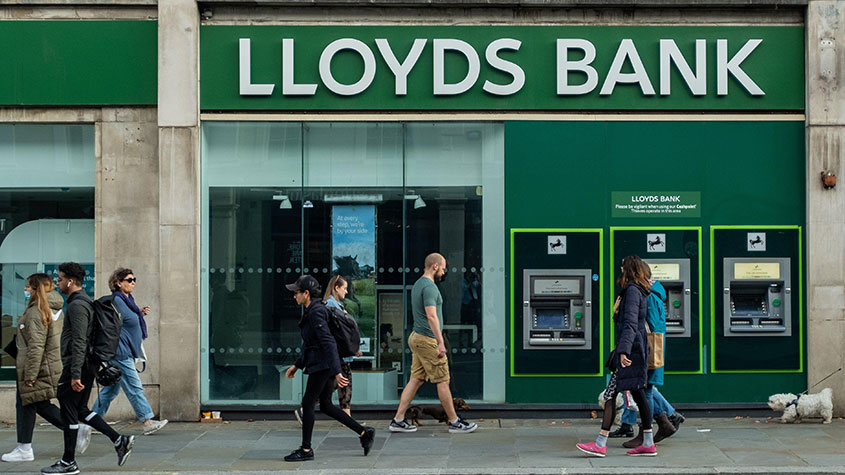Crypto scams – what to look out for
Fraudsters are using cryptocurrency scams to lure investors desperate for high returns, banking giant Lloyds has warned. Here's how to spot and avoid them


Get the latest financial news, insights and expert analysis from our award-winning MoneyWeek team, to help you understand what really matters when it comes to your finances.
You are now subscribed
Your newsletter sign-up was successful
Want to add more newsletters?

Twice daily
MoneyWeek
Get the latest financial news, insights and expert analysis from our award-winning MoneyWeek team, to help you understand what really matters when it comes to your finances.

Four times a week
Look After My Bills
Sign up to our free money-saving newsletter, filled with the latest news and expert advice to help you find the best tips and deals for managing your bills. Start saving today!
Increasing numbers of investors are being targeted by cryptocurrency scams, particularly on social media.
Lloyds Bank has revealed a 23% annual rise in customers reporting being scammed by fake cryptocurrency adverts.
The bank attributes much of this to a new wave of fake crypto adverts circulating on social media, targeting young victims.
MoneyWeek
Subscribe to MoneyWeek today and get your first six magazine issues absolutely FREE

Sign up to Money Morning
Don't miss the latest investment and personal finances news, market analysis, plus money-saving tips with our free twice-daily newsletter
Don't miss the latest investment and personal finances news, market analysis, plus money-saving tips with our free twice-daily newsletter
Fraudsters are trying to take advantage of increased interest in cryptocurrencies, especially after the Securities and Exchange Commission approved the first Bitcoin exchange traded funds for US investors, while values have hit record highs.
Social media plays host to 66% of crypto scams, particularly on Instagram and Facebook, according to Lloyds research.
Victims lost £10,741 on average to crypto scams, which overtakes the loss on any other type of fraud - up from £7,010 in 2022.
The rise comes as the cost of living continues to bite household finances, and more people are susceptible to ‘get rich quick’ promises, which scammers commonly use.
“Often fraudsters will advertise investments in an asset that doesn’t exist or hasn’t yet been built, so don’t hand over your cash unless you’re 100% confident you’re being sold a genuine, bona fide investment,” says Laura Suter, head of personal finance at AJ Bell.
“Nothing is guaranteed when it comes to investments. If a company you’ve never heard of says it can deliver Guaranteed returns of any amount, don’t touch them with a barge pole.”
The cryptocurrency market has already been under a crackdown from the Financial Conduct Authority (FCA) since earlier this year.
Crypto trading firms have been forced to give first-time investors a ‘cooling-off period’ to ensure investors fully understand the risk. The FCA also banned advertised ‘refer a friend’ bonuses from 8 October.
“The government is pressing ahead with plans to regulate crypto in line with existing financial services, which should help to tighten up the sector,” adds Suter.
“Disturbances in the cryptoverse like the FTX scandal have heightened the global regulatory focus on crypto and the risks it might pose to consumers and financial stability, if left to its own devices.”
Knowing what a crypto scams look like can help you avoid them.
What do crypto scams look like?
There are two main ways to spot crypto scams, according to Lloyds.
The illusion
The fraudster will pose as an investment manager and tell you that they will invest your money on your behalf, promising huge returns.
The scammer may show you a fake investment account showing funds that are already making a profit, but in reality, there is no genuine investment platform or cryptocurrency involved- the scammer is creating an illusion.
It’s a tactic scammers use to trick you into thinking the investment is real, and you will make a huge return. Once they get as much money as they can out of you, they will simply disappear.
The takeover
If you’re looking to open an account on a legitimate investment platform like Coinbase or Binance, fraudsters could jump on this opportunity to ‘help you.’
Scammers will either offer guidance in setting up your account or tell you they can set it up on your behalf.
Once you have deposited your funds, scammers will trick you into giving your login details to them or giving them control of your digital wallet, which they can then use to control your invested money.
Lloyds says crypto scams can come in other forms too, for example when you’re asked to pay for something with cryptocurrency. These can be common with romance and impersonation scams.
Experts also warn that despite the scams, entering the crypto market is a risk in itself, and you should mentally prepare to lose all your money when trading crypto.
Suter says: “Crypto is a highly volatile asset in a market which is lightly regulated, so investors must be willing to swallow a whole load of risk before diving in. Crypto poses multiple risks to consumers. Fraud and scams are rife, but even if you buy legitimate crypto, the most obvious risk is the potential for large losses.”
Myron Jobson, Senior Personal Finance Analyst at Interactive Investor recommends not to put all your eggs in one basket when it comes to crypto and to only allocate a small amount of your money.
“Cryptos remain a high-risk investment because of how much and how quickly their value can change unexpectedly,” he says.
“But, whatever your approach to risk, cryptos should only be a small proportion of a well-diversified portfolio.”
How to avoid crypto scams
Sometimes, crypto scams might not be as obvious to spot, so try to spot finer issues first.
Be wary of social media- First things first, question any investment-type post or message on social media, especially crypto-related. Fraudsters can easily spread fake adverts and message you directly. Look out for signs telling you that you are guaranteed a return on your investment that you won’t get anywhere else. And if you get a message out of the blue, it’s most likely a scam.
Know the regulations- The FCA has regulated the crypto market to an extent, so know the rules before entering. ‘Refer a friend’ schemes are now banned, so any adverts like this are most likely scams.
Since October 2023, crypto platforms wishing to market to UK customers have had to register with the FCA for anti-money laundering purposes. You can check if a platform has complied on the FCA's registered cryptoassets webpage.
Plus, the FCA has encouraged more firms to advertise warnings about the risk of losing money, so you can spot which adverts are genuine. Jobson adds: “Regulation of cryptoassets is developing at pace. Promotions targeting UK consumers now fall within the FCA’s remit.
The government also plans to introduce laws for the crypto industry before Parliament by 2024. Progress is being made to protect consumers from fly by night fraudsters operating in the crypto space, but there is still a long way to go before a comprehensive regulatory framework for cryptos is in place.”
Never share your login- A legitimate investing platform will never ask you to share your own login details. So, if you get asked this, don’t give it away, as it’s probably a scam. And you should never transfer funds to another account that isn’t in your name, as at that point, you will have lost control of your money.
Don’t use the cloud for back-up on security- When you access your crypto portfolio through an exchange or wallet, it requires you to log in with a password and a ‘seed phrase’ for an extra layer of security. As data stored in the cloud can easily be hacked, it’s a good idea to write down your login and any extra security information on a piece of paper and hide it safely within your home. You should stay away from storing confidential information on any device that is prone to being hacked.
Use the FCA website- Fraudsters can easily set up fake websites or social media accounts to imitate legitimate firms. To check if they are genuine, you can go onto the FCA website and find the contact details of the firm that has reached out to you. See if they match the site that you can see.
Be vigilant- Avoid clicking on any social media pop-ups that are trying to lure you in by promising you a load of money. Similarly, if you receive any messages on social media regarding ‘quick rich’ schemes, see that as a red flag and ignore it. This will most likely be a fake social media account trying to scam you. Also, it’s a good idea to set up two-factor authentication where you can on apps and websites. That way, any hacker would need your phone or another device to authenticate your login.
Get the latest financial news, insights and expert analysis from our award-winning MoneyWeek team, to help you understand what really matters when it comes to your finances.
Vaishali has a background in personal finance and a passion for helping people manage their finances. As a former staff writer for MoneyWeek, Vaishali covered the latest news, trends and insights on property, savings and ISAs.
She also has bylines for the U.S. personal finance site Kiplinger.com and Ideal Home, GoodTo, inews, The Week and the Leicester Mercury.
-
 Can mining stocks deliver golden gains?
Can mining stocks deliver golden gains?With gold and silver prices having outperformed the stock markets last year, mining stocks can be an effective, if volatile, means of gaining exposure
-
 8 ways the ‘sandwich generation’ can protect wealth
8 ways the ‘sandwich generation’ can protect wealthPeople squeezed between caring for ageing parents and adult children or younger grandchildren – known as the ‘sandwich generation’ – are at risk of neglecting their own financial planning. Here’s how to protect yourself and your loved ones’ wealth.
-
 The UK cities where it’s cheaper to buy a house than rent
The UK cities where it’s cheaper to buy a house than rentFor people in some areas of the country, home ownership is a distant dream. But for others it can be surprisingly affordable.
-
 Bitcoin 'has become the reserve asset of the internet'
Bitcoin 'has become the reserve asset of the internet'Opinion The cryptocurrency has established itself as the electronic version of gold, says ByteTree’s Charlie Morris
-
 Investment platforms rapped over low interest offered on cash holdings
Investment platforms rapped over low interest offered on cash holdingsFinancial Conduct Authority (FCA) threatens action against investment platforms paying poor rates on cash balances
-
 UK banking stocks: what’s the latest this results season, and are they worth a look?
UK banking stocks: what’s the latest this results season, and are they worth a look?All five major UK banks released their annual results in February, reporting profit increases. But the sector has long been unloved by investors. Are UK banking stocks hidden gems, or better avoided?
-
 FCA to force “cooling-off period” for new crypto investors
FCA to force “cooling-off period” for new crypto investorsNews Firms will have ensure investors have the appropriate knowledge and experience to invest in crypto as the FCA cracks down on the industry.
-
 The simple way to invest in iconic classic cars
The simple way to invest in iconic classic carsAdvertisement Feature Alternative and passion investing are areas that have seen considerable growth in recent years, but some asset classes have priced investors out. Now, The CarCrowd offers a new concept of fractional investment and is unlocking the potential of classic cars for thousands of qualifying investors.
-
 Lloyds Bank shares could see an interest-rate windfall
Lloyds Bank shares could see an interest-rate windfallAnalysis Interest rates are heading higher, which could be good news for Lloyds Bank shares as profits are set to grow.
-
 Is abrdn’s eye-catching 9.2% dividend yield sustainable?
Is abrdn’s eye-catching 9.2% dividend yield sustainable?Tips Shares in investment manager abrdn currently yield 9.2%. Generally speaking, says Rupert Hargreaves, it pays to be sceptical of very high dividend yields. So is that the case here, or is abrdn one for income investors to tuck away?
